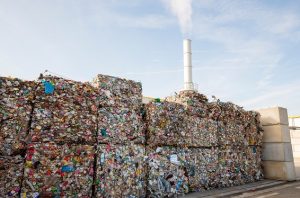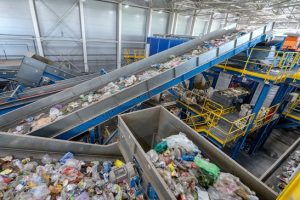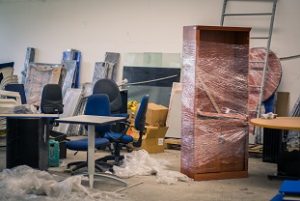
What happens to that piece of paper you throw away in your office garbage bin? Where does all the waste that is being produced by New York businesses go?
These are interesting questions that we should ask ourselves, especially when living or working in the most populated city in the United States. New York alone produces over 14 million tons of waste every year that has to go somewhere. So let’s “dumpster dive” into one of the pressing topics of modern life and see what the journey of office trash is, and how it affects our city lives.
But first…

There are 8.4 million people in New York and we all produce trash on a daily basis. The city has divided its garbage into two main categories – general waste and recyclables. Recyclables fall into several sub-categories:
Metal, glass, and plastic are collected together to ease trash gathering and later sorted in a recycling facility.

Recycling has been part of the city waste management policy since the late 1980s when curbside recycling became mandatory. The NYC Department of Sanitation (DSNY) – the largest waste management department in the world – is tasked with the management of garbage in New York. The agency is responsible for collecting, recycling, and disposing of the trash in the city.
The DSNY, however, takes care only of residential, institutional, and non-profit organizations’ waste. Commercial and industrial sites have the legal obligation to organize the disposal of their waste as the regulations require.

That means that each business has to either obtain a “Self-Hauler” permit from the Business Integrity Commission (BIC) and transport their garbage in a vehicle with commercial license plates. Alternatively, they can look for waste management services on their own and partner with a trash & recycling management business, to help them take care of the waste, including in their offices.
Having to take care of your company’s trash on your own is cumbersome and involves far more resource allocation than contracting a waste management company. That’s why most businesses prefer outsourcing their trash disposal and recycling, to a specialist in that industry.

The first stop for most office trash is the garbage can. From there, it is collected by a garbage truck and taken to a landfill. Landfills are large sites where trash is dumped and then covered with dirt. The garbage is typically compacted at a landfill, which helps to reduce its volume.
Once the trash is in the landfill, it will decompose over time. Decomposition is a natural process that breaks down organic matter. The process is slow, however, and can take years or even decades for some materials to decompose completely.
Eventually, the office trash will become part of the landfill itself. Landfills are designed to be stable, so the trash will not leach out and contaminate the surrounding environment. However, landfills can release greenhouse gasses as the trash decomposes, so they are not ideal long-term solutions for office waste.

When it comes to office waste disposal, there are a few things to keep in mind.
Paper

First, paper should be recycled. This is one waste category that is relatively easy to recycle and businesses should try their best to ensure that their paper and cardboard waste is cycled back into use. Dedicating a recycling bin for each desk will help people remember that they should make sure their paper waste is properly disposed of.

The second major waste category that office managers and waste disposal managers should focus on finding sustainable solutions for is plastics. A great number of used office supplies and kitchen silverware are non-recyclable plastics. Ensuring you have a plastic waste station or bin that is visible to everyone will prompt office workers to sort their waste as per the company’s policy.

Third, office equipment such as computers, printers, and fax machines should be donated or recycled when possible. The need of recycling electronics is especially important since they’re built with the use of valuable and depleting natural resources. Some of those materials are even dangerous for our health when not disposed of properly.
These materials not only add up to the growing landfill issues but take over 700 years to decompose, and easily end up in water resources, where they disturb aquatic life, form gigantic plastic islands, and eventually end up in our food.

Food scraps are another waste category that anyone looking to lessen their impact on the environment should consider, offices included. A company looking to include more sustainable solutions in their processes could consider creating a composting setup, where food waste can turn into compost.
Organic waste similar to paper is relatively easy to re-introduce back in our supply and demand cycles, and it’s actually often referred to as “black gold” among gardeners. Compost helps vitalize depleting urban soils, so by turning your organic office waste into fruitful compost you can contribute to a growing environmental issue.
Not to mention turning waste into resources can feel empowering and can give employees an additional boost of confidence that they’re part of a positive change.
Furniture

Finally, office furniture. If you’re planning to change your office furniture you can consider refurbishing it first. This is one way to reduce waste and give a fresh new look to your old office equipment. Or you can consider donating your old office chairs and desks to other organizations that might need them. And lastly, you can seek options to recycle as much of the office furniture as possible, to decrease the chance of it ending up in landfills.
By following these simple guidelines, office waste can be effectively managed.
As more and more businesses aim to operate sustainably, recycling in the office has become increasingly important. Not only does recycling help reduce the amount of waste sent to landfills, but it can also save businesses money on waste disposal costs. In addition, recycling can help improve the reputation of a business, as it shows that the company is committed to reducing its environmental impact.
There are several easy ways to encourage recycling in the office. By introducing a recycling policy that stipulates that all employees must recycle, businesses could make the first step to operating more environmentally friendly and cost-efficiently.
These small steps make a big difference to the amount of waste they send to landfills each year. Reducing the use of resources, reusing whenever possible, recycling, and composting hold great benefits among which are:

We all know the feeling of tossing something in the trashcan and watching it disappear. But have you ever wondered what happens to your trash after it leaves your hands? The journey of the office trash is long and complicated. Still, most of our trash ends up in landfills and creates a number of issues.
The journey of our trash is a journey that we as a society should be more involved in and do our best to make the most of the resources we have, so they don’t end up harming the environment, eco-systems, and consequently us. Starting a sustainable office waste policy is one good place to begin a more sustainable way of disposing of our garbage.